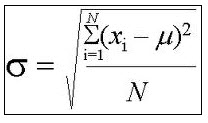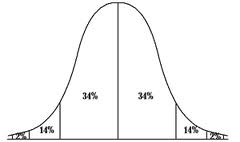Finite Population Correction Calculator
Instructions: Use this calculator to estimate the effect of a finite population on the calculation of the standard error. Please provide the standard deviation \((\sigma)\), the sample size (\(n\)), and the population size (\(N\)), in the form below:
Finite Population Correction
The standard error for the sampling distribution of sample means is computed as:
\[\sigma (\bar X) = \displaystyle \frac{\sigma}{\sqrt n}\]where \(\sigma\) is the population standard deviation of the underlying distribution. This expression holds in the case that the population size is infinite (in which case the sampling processes can be considered as sampling with replacement).
But the above expression won't be accurate if the population size is finite, equal to \(N\). In such case, there is the need to use a correction factor.
Finite population correction formula
The formula for the correction factor:
\[ cf = \sqrt{\frac{N-n}{N-1}} \]Observe that the larger N is with respect to n, the closer the correction factor becomes to 1. This makes sense, because it is saying that if the sample is relatively small with respect to the population, then the correction factor will be close to 1.
A correction factor close to 1 means that there is not correction needed.

How is the Standard Error Affected when using the correction factor?
The formula for the corrected standard error is computed instead as:
\[\sigma (\bar X) = \displaystyle \frac{\sigma}{\sqrt n} \sqrt{\frac{N-n}{N-1}} \]Notice that the correction factor converges to 1 as \(N\) approaches to infinity. If you are dealing with sampling with an infinite population size, use instead this standard error calculator .
When do we use the finite population correction
Strictly speaking, when a population is not finite we should ALWAYS use the correction factor. Often times, when the population is large enough but still finite, the correction factor can be very close to 1, making the effect of the correction factor rather meaningless.
When computing normal probabilities , or probabilities in general, it is usually the case that the population is assumed to be infinite, which leads to a correction factor equal 1, which means no correction is needed.


